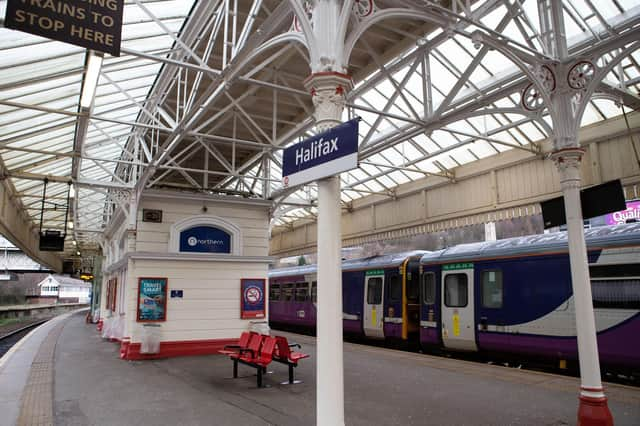Government doesn't know how derided Integrated Rail Plan 'will work on the ground', Transport minister admits


Baroness Vere, Parliamentary Under-Secretary of State for the Department for Transport, told a House of Lords debate she was unable to answer questions from cross-party peers about “what capacity will be provided for whom and when” because “we do not know that now”.
“This is a plan, and there is an enormous amount of work to do to move from the plan to the next level down — to the detail about how this will actually work on the ground," she said.
Advertisement
Hide AdAdvertisement
Hide Ad"While in some places we can be very clear about what capacity improvements will be available, in others there will be an enormous amount of designing to do and engineering options to look at, particularly when it comes to upgrading lines.
"So, service frequency, capacity and duration of journeys may be subject to change, but, of course, we always want to maximise capacity, increase service levels and reduce journey times.”
It follows ongoing controversy around the IRP’s impact on Yorkshire, which will get only two miles of new high-speed track and has seen the HS2 route to Leeds axed as well as the watering down of plans for a new high-speed line between Leeds and Manchester via Bradford.
Instead, new line will run between Warrington and Marsden on the outskirts of Yorkshire before joining existing track.
Advertisement
Hide AdAdvertisement
Hide AdBaroness Vere defended the overall approach of the IRP but also admitted that the plan has a lack of information about freight capacity.
“Although an awful lot of work has been done on this, I think all of us in Government would admit that we did not put enough of that into the integrated rail plan. I know we will work very hard to provide more information on this in due course.”
Her contribution followed cross-party condemnation of the IRP proposals.
Labour peer and former Leeds Council leader Baroness Blake said: “The IRP should have been a blueprint to enable the north to deliver its transformational economic vision. The disappointment and sense of betrayal felt across the region is immense.”
Advertisement
Hide AdAdvertisement
Hide AdShe said HS2 and the full delivery of Northern Powerhouse Rail to Leeds would have helped support 150,000 jobs and added £200bn to the economy.
Conservative Baroness McIntosh said that the “downgraded” plans for Yorkshire should be rethought as soon as possible. “That one simple step will open up and unlock the whole of the Northern Powerhouse economy, and I believe it is entirely in keeping with the government agenda to do so.”
Liberal Democrat Lord Wallace questioned whether the plans had been fully thought through.
“Northern Powerhouse Rail has now shrunk to a new line between Warrington and Marsden—a village west of Huddersfield—without any clarity as to whether that will involve doubling the Standedge tunnel to remove the bottleneck in the middle. Are the Government confident that they can reopen the two very old single-line tunnels on either side of the current double Standedge tunnel for fast and electrified trains?
Advertisement
Hide AdAdvertisement
Hide Ad"If they cannot, a new tunnel will be needed somewhere, which makes the case for it being somewhere different, rather than simply doubling the Standedge tunnel. That is the case for a second fast trans-Pennine link, which the Government have just denied."
He added: "We need to link in Bradford, Halifax and the northern Pennine towns to this metropolitan network. Without a second link, or at the very least a substantial rebuilding of the Calder Valley line, which flooded badly two years ago, we condemn Bradford as a city, and Halifax and the Pennine towns, to long-term decline.
"It takes an enormously long time to travel from Leeds to Liverpool, and it is very complicated to travel from Bradford to Sheffield. Bradford to Manchester is a long and slow journey on a crowded two-carriage or three-carriage diesel train.
"However, the costs of two miles of extra tunnelling in south London to link the expensive new property developments around Battersea power station are justified, apparently because the foreign owners of those new properties have contributed to the Conservative Party. I hope that is not correct, but that is what Private Eye suggests to me.
Advertisement
Hide AdAdvertisement
Hide Ad"What this looks like is ‘If it’s in the north, it costs too much’. The potential impact of economic transformation is left out of the calculation.”
Leeds to Liverpool journeys 'slower than Manchester to London'
The Government’s rail plans will mean it is quicker to go from Manchester to London than Leeds to Liverpool, cross-bench peer Lord Birt has warned.
The former director-general of the BBC said: “Economically, it is best to think of the heartland of the north, from Liverpool through Manchester to Leeds, as a single metropolitan area with a huge population.
Advertisement
Hide AdAdvertisement
Hide Ad"The North has long had a wholly inadequate road and rail system to connect its major centres.
“Remarkably, under the Government’s proposals in future it will be quicker to reach London from Manchester than to reach Leeds from Liverpool. That is truly shocking. The North will not thrive until the Government focus equally on all three of its major metropolitan areas.”
* Support your Halifax Courier by becoming a digital subscriber. You will see 70 per cent fewer ads on stories, meaning faster load times and an overall enhanced user experience. Click here to subscribe